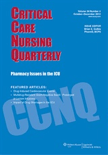
Critical Care Nursing Quarterly
Scope & Guideline
Fostering Excellence in Patient-Centered Care
Introduction
Aims and Scopes
- Patient Safety and Quality Improvement:
The journal emphasizes strategies to enhance patient safety and quality of care in critical settings, including the implementation of care bundles and protocols. - Nursing Education and Professional Development:
Research on educational interventions, training programs, and the development of competencies for critical care nurses is a key focus area. - Interdisciplinary Collaboration:
The CCNQ promotes the importance of teamwork among healthcare professionals, highlighting collaborative approaches to patient care and decision-making in critical situations. - Psychosocial Aspects of Care:
The journal covers studies on the psychosocial needs of patients and families, addressing issues such as moral distress, burnout, and coping strategies among nurses. - Innovative Technologies and Practices:
The incorporation of new technologies and innovative practices in critical care, such as simulation training and telehealth, is frequently explored to improve care delivery.
Trending and Emerging
- Mental Health and Well-Being of Healthcare Workers:
There is a noticeable increase in research addressing the mental health challenges faced by nurses, particularly in the context of the COVID-19 pandemic, emphasizing the need for supportive measures and interventions. - Application of Evidence-Based Care Bundles:
A growing trend is observed in the implementation and evaluation of evidence-based care bundles, particularly in managing conditions like sepsis and delirium, showcasing a shift towards standardized care practices. - Use of Simulation and Technology in Training:
The incorporation of simulation technologies in nurse education and training is becoming more prevalent, aimed at improving clinical skills and preparedness for critical situations. - Patient and Family-Centered Care Approaches:
Emerging research emphasizes the importance of involving patients and families in care decisions and strategies to address their needs during critical illness. - Quality Improvement Initiatives:
There is an increasing focus on quality improvement projects aimed at enhancing patient outcomes, reducing hospital-acquired conditions, and improving nursing care processes.
Declining or Waning
- Traditional Emergency Procedures:
Topics related to traditional emergency procedures, such as basic CPR techniques and standard emergency protocols, have seen a decrease as newer methods and technologies gain attention. - Generalized Nursing Theories:
Research focusing on broad nursing theories without specific application to critical care contexts is less prevalent, indicating a shift towards more specialized and evidence-based practices. - Historical Overviews of Nursing Practices:
Papers that provide historical perspectives on nursing practices are becoming less common, as the journal prioritizes contemporary issues and future directions over past practices.
Similar Journals
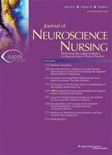
JOURNAL OF NEUROSCIENCE NURSING
Elevating Patient Outcomes in Neuroscience NursingJournal of Neuroscience Nursing, published by Lippincott Williams & Wilkins, stands as a pivotal resource within the interdisciplinary field of neuroscience and nursing. With an ISSN of 0888-0395 and E-ISSN of 1945-2810, this journal has been dedicated to advancing knowledge and practice in neuroscience nursing since its inception in 1986. It aims to provide a platform for the dissemination of significant research, clinical guidelines, and innovative care strategies that shape the future of nursing in the neurological domain. The journal is recognized in various categories, achieving a Q1 ranking in Medical and Surgical Nursing and a Q3 ranking in Neurology (Clinical) as of 2023, highlighting its influence and relevance in the medical community. Although it does not operate on an open-access model, the journal's commitment to quality is evidenced by its strong Scopus rankings, including a notable rank of #3 out of 26 in Nursing - Medical and Surgical Nursing, reflecting its vital role in fostering scholarly discourse. Located in Philadelphia, PA, the Journal of Neuroscience Nursing is an essential publication for researchers, practitioners, and students dedicated to improving patient outcomes and advancing the field of neuroscience nursing.
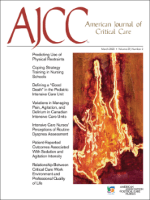
AMERICAN JOURNAL OF CRITICAL CARE
Elevating nursing practices with evidence-based insights.Welcome to the American Journal of Critical Care, a premier publication dedicated to advancing the field of critical care nursing and enriching the understanding of critical care practices. Established in 1992 and published by the American Association of Critical Care Nurses, this journal serves as a vital resource for researchers, practitioners, and students alike, providing cutting-edge research, insightful reviews, and evidence-based practices that shape modern critical care. With an impressive impact factor and distinguished rankings—ranking in Q1 for Critical Care Nursing and Q2 for miscellaneous Medicine in 2023—this journal underscores its significance in the healthcare landscape. Although it does not currently offer Open Access, the American Journal of Critical Care remains committed to disseminating high-quality knowledge that drives innovation and improves patient care in critical settings. Join us as we explore the latest advancements and pivotal studies that influence patient outcomes and shape the future of nursing practice.
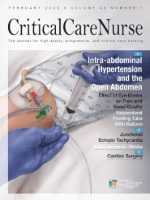
Critical Care Nurse
Bridging the Gap Between Research and Clinical PracticeCritical Care Nurse is a premier journal dedicated to advancing the field of critical care nursing, published by the American Association of Critical Care Nurses. With its consistent ranking in the Q1 category for Critical Care Nursing and impressive Scopus ranking at #8 out of 27, it serves as an essential resource for practitioners and researchers alike. The journal features innovative research, case studies, and reviews aimed at enhancing patient outcomes in critical care settings. As a significant contributor to nursing literature since 1980, Critical Care Nurse provides valuable insights and best practices that bridge the gap between theory and clinical practice, ensuring that professionals stay at the forefront of the ever-evolving healthcare landscape. While it is not an open-access journal, its high impact and relevance make it a critical read for those committed to excellence in critical care.

Nephrology Nursing Journal
Empowering Nephrology Nurses Through Research and InsightNephrology Nursing Journal, published by Jannetti Publications, Inc, serves as an essential platform for the dissemination of cutting-edge research and practical insights in the field of nephrology nursing. With an ISSN of 1526-744X and an E-ISSN of 2163-5390, this journal ensures access to high-quality content for professionals dedicated to improving patient care in renal health. Since its inception in 2000, the journal has maintained its role in advancing the profession, as evidenced by its categorization in Q3 in Advanced and Specialized Nursing and Nephrology, as well as Q4 in Medicine (miscellaneous) for 2023. Although it does not currently offer Open Access, the journal still holds a significant position within the academic community, ranking #406 out of 636 in the broader field of General Medicine, reflecting its contribution to knowledge and practice in nephrology nursing. With an unwavering focus on improving nursing practices and patient outcomes, the Nephrology Nursing Journal continues to be a vital resource for researchers, educators, and healthcare professionals alike.
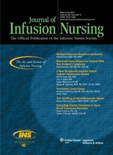
Journal of Infusion Nursing
Fostering excellence in infusion nursing practices.Journal of Infusion Nursing, published by Lippincott Williams & Wilkins, stands as a vital resource within the fields of nursing and healthcare. With a strong focus on infusion practices and patient care, this journal is committed to disseminating high-quality research and evidence-based practices that enhance nursing protocols and improve patient outcomes. As a quarterly publication, it is indexed in Scopus, ranking 32nd out of 139 in the general nursing category, with a commendable 77th percentile, highlighting its influence and relevance in the nursing community. Operating without open access, the journal is dedicated to covering a spectrum of topics from emerging techniques in infusion therapy to comprehensive reviews that inform clinical practice, making it an essential read for researchers, practitioners, and students alike. The Journal of Infusion Nursing not only facilitates knowledge sharing but also plays a crucial role in advancing the standards of nursing care in the United States and beyond.
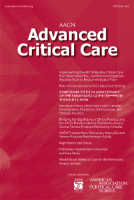
AACN Advanced Critical Care
Connecting research and practice for superior patient care.AACN Advanced Critical Care, published by the American Association of Critical-Care Nurses, serves as an essential resource in the field of critical care nursing and emergency medicine. With an ISSN of 1559-7768 and an E-ISSN of 1559-7776, this peer-reviewed journal is committed to advancing the knowledge and practice of critical care through rigorous research and innovative clinical insights. The journal holds a reputable position within its field, achieving a Q2 ranking in Critical Care Nursing and Emergency Medicine, alongside a Q3 ranking in miscellaneous Medicine categories for 2023. With a convergence of scholarly contributions from 2006 to 2024, it strives to explore the latest advancements and challenges in critical care environments, ensuring that its readership of researchers, healthcare professionals, and students are well-informed of emerging trends and best practices. The journal does not offer Open Access, however, its impact and relevance are evident from its Scopus rankings, which place it at a commendable #14 in Critical Care Nursing and #47 in Emergency Medicine. As a crucial platform for knowledge dissemination, AACN Advanced Critical Care plays a vital role in enhancing clinical effectiveness and improving patient outcomes in acutely ill populations.
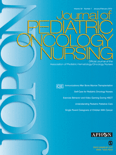
Journal of Pediatric Oncology Nursing
Advancing pediatric care through innovative oncology nursing research.The Journal of Pediatric Oncology Nursing, published by SAGE Publications Inc, serves as an essential resource for healthcare professionals and researchers dedicated to the field of pediatric nursing, particularly within oncology. With its ISSN of 1043-4542 and E-ISSN of 1532-8457, this journal has established itself as a key platform for disseminating high-quality research, innovative practices, and case studies that address the unique challenges faced in caring for children with cancer. Despite its coverage in Scopus being discontinued in 2021, the journal previously ranked 4th in the Nursing _ Pediatrics category, illustrating its impact with an 85th percentile rating, and it holds a 10th place rank in Nursing _ Oncology, demonstrating its ongoing relevance in the field. The journal's commitment to open access ensures that vital research findings are available to a global audience, assisting in the improvement of nursing practices and patient care. Engaging both seasoned professionals and aspiring researchers, the Journal of Pediatric Oncology Nursing continues to be a cornerstone for advancing knowledge and enhancing the quality of care for pediatric oncology patients.
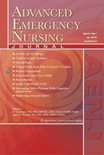
Advanced Emergency Nursing Journal
Advancing Knowledge in Emergency Nursing ExcellenceAdvanced Emergency Nursing Journal, published by Lippincott Williams & Wilkins, stands as a key resource within the domains of Emergency Medicine and Emergency Nursing. With a commitment to advancing the field, this journal provides a platform for rigorous research, critical reviews, and innovative practices aimed at enhancing patient care in emergency settings. Though it holds a Q3 ranking in both related categories as per the 2023 metrics, its global reach spans various aspects of emergency care, promising insights that are crucial for both professionals and academics alike. Covering topics from clinical procedures to policy analysis, the journal invites submissions that aim to bridge theory and practice, highlighting the importance of evidence-based approaches in emergency nursing. Researchers, educators, and healthcare practitioners can Find more information and explore their own contributions in a dynamic environment that continuously evolves with the field. Whether you're seeking to stay current with the latest advancements or to publish your findings, this journal is an essential asset for those dedicated to improving care in urgent medical situations.
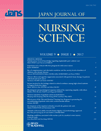
Japan Journal of Nursing Science
Exploring Evidence-Based Solutions for Modern HealthcareJapan Journal of Nursing Science, published by WILEY, serves as a pivotal resource in the field of nursing, focusing on innovative research and theoretical developments that enhance nursing science practices. With an ISSN of 1742-7932, this journal has established itself as a reputable platform, reflected in its 2023 rankings, which place it in the Q2 category for both Medicine (miscellaneous) and Research and Theory. Covering a broad range of topics crucial to the advancement of nursing, the journal provides researchers, professionals, and students access to high-quality studies, methodologies, and discussions that shape contemporary nursing practices and policies. Though not an Open Access journal, it contributes significantly to the academic discourse and research community, with emphasis on fostering evidence-based practices and promoting excellence in nursing education and healthcare delivery. With a cumulative publishing history from 2006 to the present, the Japan Journal of Nursing Science is committed to disseminating vital knowledge that enriches the nursing profession and improves patient care.
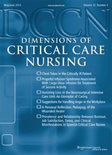
Dimensions of Critical Care Nursing
Transforming Critical Care Through Multidisciplinary CollaborationDimensions of Critical Care Nursing, published by Lippincott Williams & Wilkins, is a premier journal dedicated to advancing the knowledge and practices within the fields of critical care and emergency nursing. With a distinguished history dating back to 1982, this journal plays a vital role in disseminating cutting-edge research, clinical advancements, and educational resources aimed at enhancing patient care in high-stakes environments. The journal is ranked in the Q2 quartile for both Critical Care Nursing and Emergency Nursing, reflecting its significant impact on the nursing field, with Scopus rankings placing it at #11 in Critical Care Nursing and #14 in Emergency Nursing. Targeting a multidisciplinary audience of researchers, clinicians, and students, the journal serves as a critical platform for discussions surrounding innovative patient care strategies, evidence-based practices, and emerging trends in critical nursing. Although it is not an open-access journal, it provides valuable insights that are essential for shaping the future of nursing practice. Stay informed on the latest research and contribute to the evolving landscape of critical and emergency care through Dimensions of Critical Care Nursing.